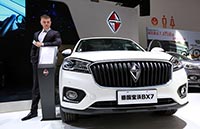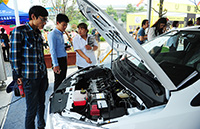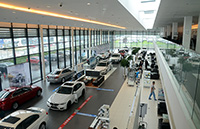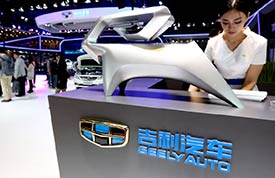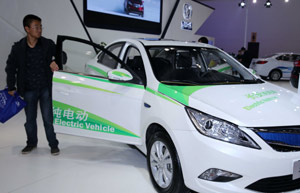Domestic car manufacturers aim to become more premium than peers
[2016-09-26 09:12]More domestic car brands have demonstrated their eagerness for recognition as premium, although none of the Chinese peer group have yet revealed a strategy that will lead them to the top.
Hesitation is a difficult roadblock to pass
[2016-06-27 15:09]Imagine being in a car that takes you from one place to another while you work (or sleep) in the rear seat. You'd just input an address and the car would find the best route to get there, and then drive to that destination. The car would even be capable of leaving you exactly where you wanted to go and then continue alone to park in the nearest available spot.
Localization isn't always the answer
[2016-05-30 09:27]Localization is an exciting word for those in China's auto industry. After all, it implies the importance of the Chinese market, means new job opportunities, brings specifically designed cars and generates taxes.
Automakers struggle to juggle different hats
[2016-05-23 14:30]Japanese automakers are making headlines these days for their wrongdoing but their misconduct might prove positive for customers and automakers in China.
Looks alone not enough to woo consumers
[2016-04-25 10:12]Car buyers are becoming more diverse, demanding product options that let them remain connected
Car connectivity to drive future
[2016-04-25 10:13]Young users increasingly open to smart vehicle options
Electric cars shape China's auto future
[2016-04-25 10:11]Convergence digitalization and car sharing services expected to boost the sale of NEVs
Sales of locally made car to rise slightly on backs of govt policies
[2015-11-02 08:36]In line with forecasts, both production and sales of passenger cars in September saw considerable growth in the preceding month.
China passenger vehicle market to recover: Fitch
[2015-10-29 16:56]China's passenger vehicle sales are likely to improve in the fourth quarter of 2015 on the back of favorable government policies.
The cost ineffectiveness of new energy vehicles for urban buyers
[2015-09-28 10:02]Individual demand is the only hope for the new-energy vehicle market and carmakers have no choice but to lower their new-energy vehicle costs to reasonable levels.
Tuning in can help find answers to your auto woes
[2015-09-16 09:51]The car service market in China has been booming after more and more private cars entered the roads in the past two decades.
China's automotive story is far from over
[2015-09-01 16:48]The downswing in passenger vehicle sales in China deepened further in July, with sales of locally-made models dropping by 6 percent on last year.
Double-hit leads to escalating market adjustment
[2015-08-03 14:33]In June, sales of passenger vehicles in China declined in year-on-year terms for the first time since the global financial crisis in 2008.
Vehicle makers on bumpy road to international status
[2015-06-30 09:24]The growth in Chinese vehicle exports in recent years has prompted original equipment manufacturers to navigate the next wave of globalization, including sales and service networks and dealer networks.
Is the market resilient enough to withstand the challenges ahead?
[2015-05-11 13:55]In March, China's light vehicle market showed signs of slowing down, with sales of locally-made models growing by 5.7 percent year-on-year versus the 6.1 percent seen in the first two months of this year.
Insiders warn car inventory could impede 2015 growth
[2015-03-09 07:55]China's light vehicle market should have experienced a strong start to the year, given the longer than usual busy selling season that preceded Spring Festival.
Cyclical growth dip expected for light vehicles in 2015
[2015-02-02 14:33]In December 2014, China's light vehicle market exceeded prior expectations.
Local govts should promote use of electric cars
[2014-11-18 13:09]Local governments in cities such as Shanghai, accustomed to promoting e-bikes and banning gasoline scooters, need only make a small switch to promote xEVs.
Insights on China's auto industry
[2014-10-27 07:45]
The Global Automotive Forum 2014 held in Wuhan, discussed the theme of transformation in China's automotive industry as leaders shared their insights on a series of topics.
Natural gas vehicles to grow in China, expert say
[2014-09-26 17:38]China will become the world's largest market for natural gas vehicles as the country moves away from diesel and gasoline to combat its growing air pollution problem.

